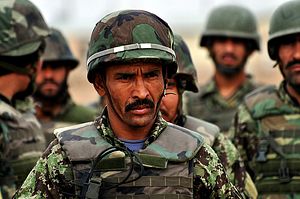On October 9, General Abdul Rashid Dostum, the first Vice President of Afghanistan, announced he would lead a military operation to help clear the city of Kunduz of insurgents. The announcement comes as security forces have struggled to combat the growing militancy in the beleaguered city.
Dostum claimed “there are issues in the leadership of the security forces in Kunduz fighting against the Taliban.”
The governor of Kunduz backed up those claims during an interview with Tolo News on Sunday, “I asked that first we should clear the entire city. But General Murad (who is also the Kunduz war commander) did not accept my suggestion and moved according to his own plan. I was worried about this (crisis) and then it happened,” Omarkhil said.
Dawalt Waziri, the spokesperson for the Ministry of Defense, rejected the criticism of General Murad, “Everywhere that General Murad has conducted operations, he has achieved good results. I don’t know why Omarkhil has said such things and I don’t want to analyse it,” said Dawlat Waziri, spokesman for the Afghan Ministry of Defense (MoD).
Afghan security forces have struggled to push the Taliban out of Kunduz city since the resurgent forced launched coordinated attacks on Monday. Following Monday’s assault, General Dostum has played a central role in operations in Kunduz, manning a Command and Control Center at the Ministry of Defense to help coordinate ground operations with General Murad.
General Dostum’s micromanaging of battlefield operations in Kunduz provides a window into the microcosm that Kunduz represents compared to the rest of Afghanistan. Dostum’s role as a civilian government leader is not to dictate battlefield operations; yet throughout the last couple years Dostum has utilized Afghan security forces as his own private militia to launch operations in his home province of Jowzjan, located in northern Afghanistan. His meddling in Kunduz is likely to exacerbate the already tense patronage network that dominates Kunduz province.
In an interview with Radio Free Europe, Omar Safi, the former Governor of Kunduz remarked that corruption was the main culprit destroying the city, “President [Ashraf] Ghani approved 550 million Afghani to Kunduz city, just to make a security belt for Kunduz, this money was all lost, misused” he said.
Barmak Pazhwak, the senior Afghanistan program officer at the U.S. Institute of Peace stated ,“Kunduz, unfortunately, is practically a divided province. It is divided among a few power brokers, warlords, and a patronage system that could be traced all the way to Kabul.”
Furthermore, Kamal Safi, a member of the Afghan parliament representing Kunduz quipped, “Kunduz is known as a small Afghanistan in the sense that all tribes who live in Afghanistan live in Kunduz as well, from all the small tribes [and] big tribes.”
The second collapse of Kunduz highlights a major problem for Afghan security forces, lack of coordination among forces, misuse of forces for private gain, and interference of local governance on tactical decisions.
Dostum’s micromanaging of operations in Kunduz is a continuation and entrenchment of patronage politics in the war torn city. Likely hedging his bets against a collapse of the National Unity Government, Dostum has been utilizing Afghan military forces to carve out support in northern Afghanistan, and to balance interests against his rival, the powerful Govenor of Balkh Province, Mohammed Attah Noor- the same man Dostum fought with after the U.S. led invasion in 2001 over control of northern Afghanistan.
The last thing Afghanistan needs right now as it struggles to end sieges in Farah, Lashkar Gah, and Kunduz is another warlord promising quick resolution to instability to gain political capital; Dostum’s meddling in Kunduz is opportunism at its best.

































